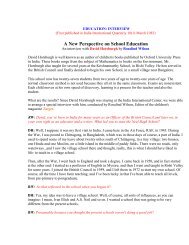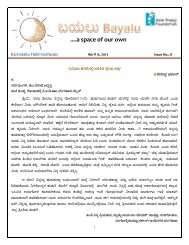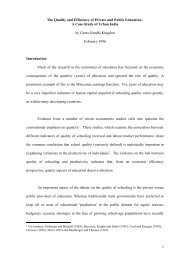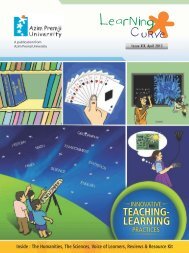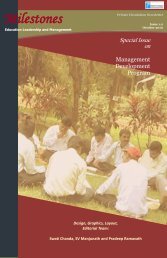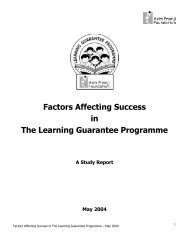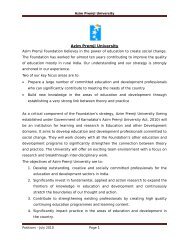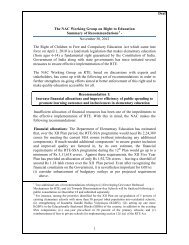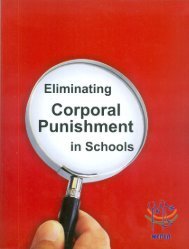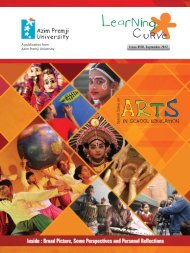Indesign Pagesnew.indd - Azim Premji Foundation
Indesign Pagesnew.indd - Azim Premji Foundation
Indesign Pagesnew.indd - Azim Premji Foundation
You also want an ePaper? Increase the reach of your titles
YUMPU automatically turns print PDFs into web optimized ePapers that Google loves.
Lesson 3<br />
Accidental Crossing of Brahmaputra...<br />
Once, Arvind took me to Guwahati; it was a 3-day workshop<br />
of a class 5 book that was already in progress. In a way I<br />
had hoped that Panchayats would never again comeback<br />
to me. But even more curiously, I never thought the theme<br />
water could be a point of discussion near the banks of<br />
Brahmaputra, and my textbook knowledge about this State<br />
was limited to the fact it rains the most here! To me water<br />
could be problems of MP or Rajasthan. Yet it was decided<br />
that the chapter can discuss common property resources.<br />
And it turned out that the most important of them were<br />
the ponds (water!) While textbooks of Rajsthan and MP<br />
discussed how/ which colony could be chosen to implement<br />
a program, it was some theme relating to maintenance and<br />
protection of ponds that was important to Assam. Hence,<br />
it was decided that the image/ role of Panchayat could be<br />
built around a need that children who come to school may<br />
otherwise experience. But aside from this commonality I<br />
would like to point out another learning.<br />
Similarly, social science is a subject which is<br />
burdened with making citizens and readers<br />
(children in this case) become future voters<br />
- mind you ‘voters’ and not ‘strugglers’ or<br />
‘fi ghter woman representatives’. Isn’t this<br />
where the middle class values confl ict and<br />
therefore allow the state to perpetuate?<br />
You may have noticed that in the three episodes, Panchayat<br />
chapter is being discussed at class 4, class 5 and class 6.<br />
Have you ever wondered what the logic is for this? This partly<br />
emerges from the complicated hierarchies of schooling that<br />
we practice in different parts of the country. The so called<br />
national (say in CBSE and ISC) and many Hindi speaking<br />
regions practice - defi ne class 6 to 8 as middle school. Most<br />
States in the peripheries have middle school as class 5 to 7.<br />
Often there is the unstated desire to ‘match’ up with national<br />
Section B<br />
Oh! Panchayat: Loose Lessons While Doing Social Science Textbtooks<br />
level, (while those elite in the national level have already<br />
moved to think of IB’s where Panchayat’s are probably nonexistent).Is<br />
it possible that education remains a concurrent<br />
subject, but curriculum, syllabus, textbooks seem to get<br />
anchored on to a national model?<br />
And by some interesting pedagogical rules “spiralling” and<br />
“local to remote” are slogans of textbook writers. Therefore,<br />
at the national level Panchayat appeared (past tense, we<br />
seem to have come over this obsession) in class 3, state<br />
government in class 4 and central government to UN in class<br />
5. The so called “spiralling” brought them back in classes<br />
6,7,8 and then again clubbed the local governments and<br />
state governments to class 9 and to class 10. But then since<br />
the schooling system in various States has had different<br />
defi nition of where the primary ends and upper/middle<br />
begins, the textbook content often gets manipulated. I<br />
realised that the psychological determinism - that a concept<br />
or theme could be taught only at a particular level - as fake<br />
jingoistic belief - truly we do not know how to practice I<br />
guess? In the name of spiralling aren’t we merely asking<br />
children to recall information on how the Panchayats are<br />
formed 3 times during their school lives?<br />
Lesson 4<br />
Unfi nished Chapters<br />
In spite of the fact that by now half my life has been lived<br />
outside the so called home state, people still consider me<br />
to know a whole lot of things about “back there” Kerala. It<br />
becomes an even more diffi cult situation because textbook<br />
writers often want to talk about the so called participatory<br />
democracy that is supposed to have been practiced in<br />
the State of Kerala. And I trace my roots to one of those<br />
villages - Chapparapadavu Panchayat – that had become<br />
an icon of the event. Apparently the year I began to work<br />
with textbooks & panchayat was also the time when the<br />
so called participatory planning began back there, as a red<br />
Latin American import. By then many states had reinvented<br />
the Panchayati raj institutions under the “new” amendment<br />
and therefore inevitably harped on the idea that “power to<br />
the people” needs to get refl ected in textbooks. Moreover<br />
the World Bank funded DPEP had selectively insisted on<br />
experimenting with Kothari Commission report that the<br />
Panchayati Raj institution was a solution to the problems of<br />
education system. Within the whole discussion occasional<br />
recall to the memory of Gandhiji would make Panchayati raj<br />
Pg No: 66



